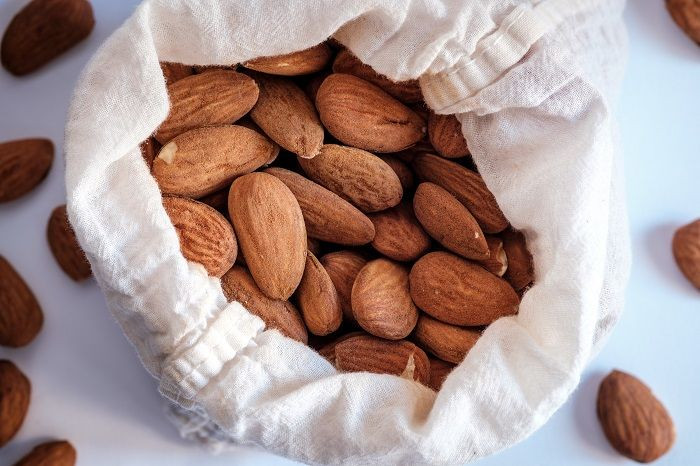 Close-up of an almond, a common nut
Close-up of an almond, a common nut
Almonds are often hailed as a healthy snack for humans, packed with nutrients that can contribute to heart health, stable cholesterol, and balanced blood sugar. As a cat owner, you’re naturally invested in your feline friend’s well-being and diet. So, when it comes to almonds, you might wonder: Can Cats Have Almonds? Perhaps your curious cat has shown interest in the almonds on your kitchen counter, or maybe you’re considering offering them as a treat.
While a nibble of your almond-topped dessert might pique your cat’s interest, it’s important to understand the full picture before sharing this popular nut. Let’s delve into the world of cats and almonds to uncover whether they are a safe and suitable snack for your beloved pet.
Are Almonds Safe for Cats? The Quick Answer
Toxicity: Not Toxic (Sweet Almonds in Small Amounts)
Allergenic Potential: Low
Species Appropriateness: Not Species-Appropriate
Feeding Frequency: Occasional (Not Recommended)
Serving Size: Supplemental (Small Amounts Only, Not Recommended)
In brief, the ASPCA confirms that sweet almonds, the common variety we eat, are not considered toxic to cats in small quantities. Accidental ingestion of a few almonds is unlikely to cause serious poisoning. However, this doesn’t mean almonds are a healthy or recommended treat for your feline companion.
Nutritional Value of Almonds for Cats: Are There Any Benefits?
While almonds boast nutritional benefits for humans, the same doesn’t necessarily translate to cats. In theory, almonds contain protein and healthy unsaturated fats, which are essential nutrients for cats. Protein supports tissue growth and repair, while healthy fats contribute to healthy skin, fur, and joint function.
Almonds are also a source of fiber, which can aid in digestion and prevent constipation. Additionally, they contain antioxidants like Vitamin E, known for their anti-inflammatory and potential cancer-fighting properties in humans. Almonds can also help regulate cholesterol, blood sugar, and blood pressure in humans, benefits that might extend to cats.
However, despite these potential theoretical advantages, the drawbacks and risks associated with feeding almonds to cats significantly outweigh any possible benefits. It’s crucial to consider why almonds are not an ideal snack for your feline friend.
Risks of Feeding Almonds to Cats: Why They Aren’t Recommended
 bowl of almonds for cats
bowl of almonds for cats
Even though sweet almonds aren’t classified as toxic to cats, several risks make them a less-than-ideal treat option.
1. Digestive Upset: Almonds are high in fat and difficult for cats to digest properly. This can lead to gastrointestinal issues such as vomiting, diarrhea, and stomach upset. The richness of almonds can also trigger pancreatitis, a painful inflammation of the pancreas, especially in cats prone to digestive sensitivities.
2. Choking Hazard: The size and hard texture of almonds pose a significant choking hazard for cats. They can easily become lodged in the throat or windpipe, especially for smaller cats or kittens.
3. Intestinal Obstruction: If swallowed whole or in large pieces, almonds can potentially cause an intestinal blockage. This is a serious condition requiring veterinary intervention, sometimes surgery, to resolve.
4. Lack of Nutritional Necessity: Cats are obligate carnivores, meaning their primary nutritional needs are met through animal protein. Almonds, being plant-based, do not align with their dietary requirements and offer no essential nutrients that they can’t obtain more effectively from a balanced cat food diet.
5. Bitter Almond Toxicity: It’s critical to differentiate between sweet and bitter almonds. Bitter almonds contain cyanogenic glycosides, which release cyanide – a potent poison – when ingested. Even small amounts of bitter almonds can be toxic to both humans and cats, leading to severe cyanide poisoning. While sweet almonds are commonly sold for consumption, the risk of accidental exposure to bitter almonds warrants caution against feeding any type of almond to cats. If you suspect your cat has consumed bitter almonds, immediate veterinary attention is crucial.
Almond Milk and Almond Butter for Cats: Are They Safer Options?
What about almond by-products? Are almond milk or almond butter safer alternatives for cats?
-
Almond Milk: While almond milk eliminates the choking hazard of whole almonds and is more digestible, it’s still not a nutritionally beneficial drink for cats. While it’s preferable to cow’s milk (as cats are often lactose intolerant), almond milk is still high in fat and calories and offers minimal nutritional value for felines. Water is always the best hydrating beverage for your cat.
-
Almond Butter: Similar to almond milk, almond butter bypasses the choking hazard but remains high in fat. This high-fat content can still cause digestive upset and is not a healthy addition to a cat’s diet. Furthermore, some almond butters contain added sugars, salt, or artificial sweeteners like xylitol, which are toxic to cats.
Are Almonds Used in Commercial Cat Food?
You’ll rarely find almonds listed as an ingredient in high-quality commercial cat food. Cat food formulations prioritize animal-based proteins and nutrients that are biologically appropriate for felines. Manufacturers typically avoid nuts due to their high fat content and lack of essential nutrients for cats compared to meat sources.
Instead of nuts, you are more likely to find cat foods containing small amounts of easily digestible plant-based ingredients like sweet potatoes, pumpkin, cranberries, or blueberries. These are often added for fiber, vitamins, and antioxidants in cat-appropriate proportions and preparations.
Do Cats Even Like Almonds? Taste and Feline Preferences
 Almond inside a cotton sack
Almond inside a cotton sack
Cats are obligate carnivores, and their taste preferences are primarily geared towards meat and savory flavors. While individual cats may exhibit curiosity towards various human foods, including almonds, it’s unlikely that almonds are inherently appealing to their palate. Their lack of strong meaty or savory aromas and flavors makes them less enticing to most felines compared to meat-based treats.
However, curiosity can sometimes outweigh natural instincts, and some cats might still try to nibble on an almond if given the opportunity. This curiosity doesn’t equate to a desire or nutritional need for almonds.
Frequently Asked Questions About Cats and Almonds
Q: What should I do if my cat eats almonds?
A: If your cat has eaten only one or two sweet almonds, there’s usually no cause for alarm. Monitor your cat for any signs of digestive upset, such as vomiting or diarrhea. If these symptoms are mild and resolve within a day, it’s generally not a concern. However, if your cat has ingested a larger quantity of almonds or if they exhibit severe symptoms like persistent vomiting, diarrhea, lethargy, or signs of distress, consult your veterinarian immediately. If you suspect your cat has consumed bitter almonds, seek urgent veterinary care without delay.
Q: What nuts are toxic to cats?
A: Macadamia nuts are definitively toxic to cats and should be strictly avoided. While not all nuts are toxic in the same way as macadamia nuts or bitter almonds, many others, including walnuts, pecans, and peanuts, can cause digestive upset in cats due to their high fat content. It’s generally best to avoid feeding nuts of any kind to your cat.
Q: Can cats eat sweet almonds safely in large quantities?
A: No, even though sweet almonds are not toxic in small amounts, feeding them in large quantities is not safe. The high fat content and indigestible nature of almonds can lead to significant digestive problems, including vomiting, diarrhea, and pancreatitis. They also present a choking hazard and risk of intestinal obstruction.
Q: Are there any nuts that are safe for cats?
A: Given the potential risks and lack of nutritional benefits, it’s generally advisable to avoid feeding cats any type of nuts. There are no nuts considered definitively “safe” and beneficial for feline consumption. If you’re looking for healthy treat alternatives, opt for small pieces of cooked plain chicken, turkey, or fish, which are species-appropriate and well-tolerated by most cats.
In Conclusion: Almonds Are Not a Recommended Treat for Cats
While sweet almonds are not inherently poisonous to cats, they are not a healthy, safe, or recommended treat. The risks of digestive upset, choking, and potential intestinal blockage, coupled with their lack of nutritional value for obligate carnivores, make almonds an unsuitable snack for your feline companion. Bitter almonds, on the other hand, are toxic and pose a serious health risk.
Prioritize your cat’s health and well-being by sticking to a balanced diet of high-quality cat food and species-appropriate treats. If you have any concerns about your cat’s diet or potential ingestion of almonds, always consult with your veterinarian for personalized advice.


